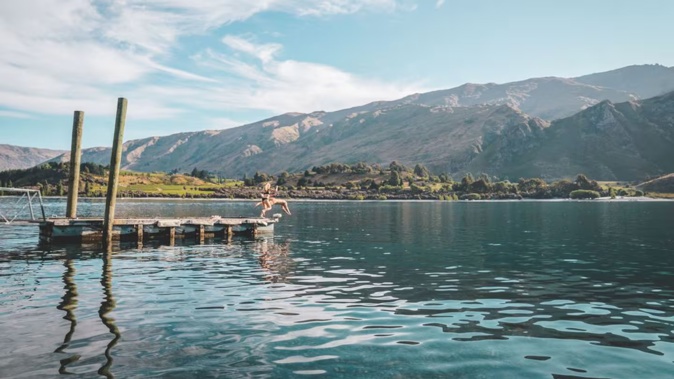

- Jinwoo Park, 21, drowned in Lake Wānaka, possibly after developing a sudden abnormal heart rhythm.
- His body was found on the lake floor but a member of the public couldn’t get him to the surface. Park’s body was recovered the next day.
- A coroner said that even if a life ring had been on a pontoon nearby, it would not have saved him.
A fit, young tourist who was a strong swimmer and spent time in the Korean Navy disappeared below the surface of Lake Wānaka so quickly that a friend only 5m away could not help him.
A coroner has found that the death of Jinwoo Park, 21, was caused by drowning, possibly after he developed a sudden abnormal heart rhythm.
Coroner Andrew Schirnack said that Park’s friend, who was on a pontoon in the lake, saw him stop swimming suddenly, wave his hands from side to side, and then sink below the surface.
He showed no signs of pain or fear before he died. The police dive squad recovered his body the following day.
Park, a Korean national, and his friend arrived in New Zealand in September 2022 to travel around the country.
On November 24 that year, they arrived in Wānaka and went swimming in the lake.
Park’s friend swam to a pontoon moored about 50m from the shore. Park then followed.
When Park stopped swimming and sank, his friend jumped into the water to help him, as did two passers-by, one of whom found Park’s body on the lake floor but could not bring him to the surface.
A post-mortem examination found caffeine, nicotine and trace levels of alcohol in Park’s blood and no other drugs. The alcohol was most likely generated after he died rather than from him drinking.
“The pathologist notes a ‘strong possibility’ that Mr Park developed a sudden abnormal heart rhythm, resulting in insufficient blood being pumped by the heart, leading to him being unable to continue swimming or maintain buoyancy,” Coroner Schirnack said.
Park’s friend had said that he was a “good swimmer” who liked the water and could swim 100m.
He had spent 20 months in the Korean Navy for his compulsory military service and led a healthy lifestyle, was fit and went to the gym regularly.
At the coroner’s request, Drowning Prevention Aotearoa (DPA) provided an analysis and recommended hazard assessments for anchored pontoons, water safety signs and that rescue equipment be made available.
However, the coroner said that while not detracting from DPA’s recommendations, he was not satisfied Park’s death could be linked to the absence of any safety assessment made in relation to the pontoon, and he probably would have gone for a swim even if signage was present.
DPA said that a life ring on the pontoon could have saved Park’s life but Coroner Schirnack said that his friend did not at first appreciate that Park was in trouble.
“He reports that, shortly after he did realise, Mr Park suddenly sank below the water,” the coroner said.
“I have significant doubt about whether a life ring, had it been available, would have been thrown to him in time, and if it had, Mr Park would have had the capacity to attach himself to it.”
Despite this, the coroner said he would distribute the DPA report to relevant authorities for consideration.
Ric Stevens spent many years working for the former New Zealand Press Association news agency, including as a political reporter at Parliament, before holding senior positions at various daily newspapers. He joined NZME’s Open Justice team in 2022 and is based in Hawke’s Bay.

Take your Radio, Podcasts and Music with you









